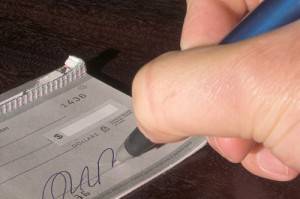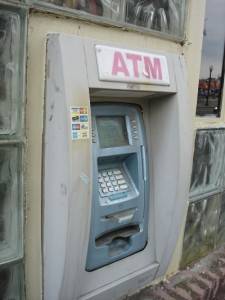Bad Check Laws – California Penal Code Section 476a
Bad Check Laws – Overview
The bad check law of California recognizes the act of knowingly writing a bad check as a punishable crime. A bad check is written when a person (“drawer”) writes a check to a person or business (“payee”) knowing that there are insufficient funds to cover the amount of the check, or if the drawer stops payment after writing the check.

To be convicted, the prosecution must prove that at the time you wrote the check, either acting on behalf of yourself or as an agent to another, there was a lack of sufficient funds to cover full payment of the check. The prosecution must also show that you were aware of the insufficient funds at the time and that you acted with the intent to defraud.
As defined under California Penal Code Section 476a, writing a check while knowing that funds are insufficient can be charged as a misdemeanor offense that can result in sentence of up to one year in county jail.
This crime is also penalized civilly under California Civil Code Section 1719, which imposes the obligation to not only pay the face amount on the check, but also a statutory service charge or a statutory penalty charge.
Bad Check Charge- Possible Defenses
If charged with this crime, you can raise certain “good-faith” defenses. It often occurs that a person charged with writing a bad check had honestly believed that he/she had sufficient funds, or was simply absent-minded when writing the check.
To be convicted of this crime, a person must have “knowingly intended to defraud.” Any showing that no such intent existed at the time the check was written is a valid legal defense to this charge. A person, therefore, who writes a bad check, but acts in good-faith, may only be required to pay the face amount of the check without incurring any additional penalties.
Bad Check Charge – Sentencing and Punishment
Under California Penal Code Section 476a, the crime of writing a bad check while aware of insufficient funds with intent to defraud is punishable as a misdemeanor if the total amount of the checks written does not exceed $950. Punishment for a misdemeanor offense entails imprisonment in the county jail for a period of up to one year.
The offense may be filed as a felony if the total amount of the checks written exceeds $950, or if the defendant had previously been convicted of certain forgery crimes. A felony conviction may result in imprisonment in the state prison for up to three years.
Under California Civil Code Section 1719, the drawer will be required to pay to the payee (1) the amount indicated on the check and (2) a statutory service charge for an amount not exceeding $25 for the first check, and for an amount not exceeding $35 for each subsequent check.
If the drawer fails to pay this amount in full, the payee may then make a written demand that will require the drawer to pay (1) the amount indicated on the check, (2) any applicable statutory service charges, and (3) the costs to mail the written demand for payment. If the drawer then fails to pay in full within 30 days, then the drawer will be required to pay (1) the amount indicated on the check and (2) a statutory penalty of 3 times the amount indicated on the check, but not less than $100 or more than $1,500.
Bad Check Charge – Prosecution

In order to prove that the defendant was guilty of writing a bad check with the intent to defraud, the prosecution must prove that:
1. The defendant willfully made, delivered, drew, used, or attempted to use a bank check for the payment of money;
2. The defendant acted for himself/herself or as an agent or representative of another person or corporation;
3. There were insufficient funds available to cover full payment of the check at the time the defendant made, delivered, drew, used, or attempted to use the check;
4. The defendant knew that there were insufficient funds available; AND
5. The defendant acted with the intent to defraud
Notes:
- Someone commits an act willfully when he or she does it willingly or on purpose.
- Someone has the intent to defraud if he/she intends to deceive another person either to cause a loss of money, goods, services, or something of value, or to cause damage to a legal, financial, or property right.
- A check is a written document directing a bank, person, or corporation to pay the indicated amount to a person named as a payee.
Bad Check Charge – FAQs
1. Can I still be charged for writing a bad check if no one was actually defrauded or actually suffered a loss from it?
Yes. For the purposes of this crime, it is not necessary that anyone actually be defrauded or suffer a financial, legal, or property loss as a result of your actions. The crime is completed when you write a bad check knowing you have no money and have the intent to defraud.
2. Can I be charged for other crimes if the check was used to buy items?
Yes. If you used a check with insufficient funds to obtain property, you may also be charged with grand theft under California Penal Code Section 487. However, you cannot be sentenced on charges of writing a bad check and grand theft for the same conduct.
3. If I used multiple checks, can I be charged a separate count for each check?
In general, the prosecution may charge a separate count for each check when the total amount exceeds $450. However, if the individual checks do not meet the $450 amount, and the offense is charged as a felony only because the total value exceeds the statutory amount, the prosecution can only charge a single felony count covering all the checks. If the felony charge is based on prior forgery-related convictions, the prosecution may charge each check as a separate felony count.
4. Do I have to be the one to write and sign the check to be charged?
No. Although the person who is normally charged with passing a bad check is the one who signed it, a person who knowingly passed it on or endorsed the check may also be charged.
5. If I’m facing a bad check charge, is there any way to reduce the charge?
Yes. In some cases, if you retain a criminal defense law firm once you learn that you are being investigated for a bad check charge, it is possible that the criminal charges against you can be avoided. This will depend upon whether your law firm will be able to effectuate what is called a “civil compromise” per Penal Code Section 1377-1378.
Call Wallin & Klarich Today

If you are facing allegations that you knowingly wrote a bad check with the intent to defraud, it is important for you to consult with a skilled criminal defense attorney with knowledge of bad check law. At Wallin & Klarich, our attorneys have over 40 years of experience in helping people overcome allegations of knowingly writing checks without sufficient funds.
With offices in Los Angeles, Sherman Oaks, Torrance, Orange County, San Diego, Riverside, San Bernardino, Ventura, West Covina, and Victorville, there is a Wallin & Klarich attorney experienced in criminal defense near you, no matter where you work or live.
Call us today at (877) 466-5245 . We will be there when you call.

